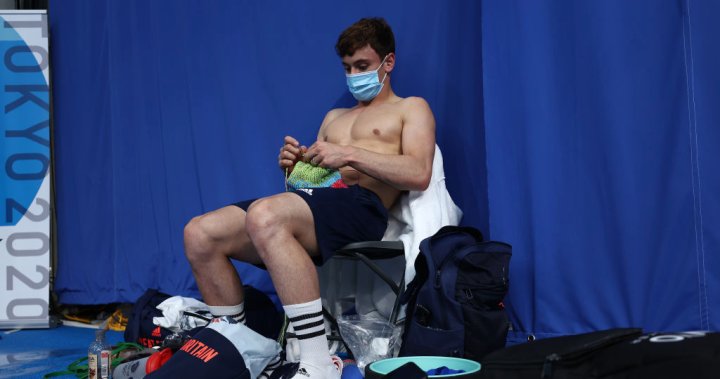NHL enforcer Georges Laraque had a secret.
“I wasn’t obviously raving about it in the dressing room.”
The 13-year league veteran kept his pre-game routine to himself for years.
Read more:
Canada welcomes Olympians home after record-breaking 2020 games
“I didn’t tell the guys that when I (went) to the grocery store and those little magazines that would give you a sneak preview of the next week, I would get those. And then if somebody ever saw me, I would say it’s for my mom or the neighbour or whatever.”
Those magazines? They covered the world of daytime drama.
The pregame routine? Ahead of game night, Laraque would watch the long-running soap opera Days of Our Lives.
“Because the job that I had there was so much pressure, that was a way — a routine that I had — that my body kind of knew was the time to relax and take a nap after that.”

Linesman Jonny Murray, right, gets caught between Nashville Predators’ Stu Grimson, left, and Edmonton Oilers’ Georges Laraque (27) during a fight in the first period Saturday, Dec. 8, 2001, in Nashville, Tenn. THE CANADIAN PRESS/AP-Mark Humphrey.
THE CANADIAN PRESS/AP-Mark Humphrey
The pregame routines and rituals of athletes go far beyond the stereotypical jock-jam soundtrack.
With needles in hand in the Olympic stands, Britain’s Tom Daley made headlines around the world not just for his gold- and bronze-medal performances but also for his poolside pastime — knitting.
After winning the men’s synchronized diving event, Daley shared on his Instagram account that the craft helps him stay calm.
“The one thing that has kept me sane throughout this whole process is my love for knitting and crochet and all things stitching,” said Daley.
He documents projects created for himself, his husband, their young son and friends on his Instagram page, MadeWithLovebyTomDaley.
That includes a knitted pouch for his gold medal, with a Union Jack on one side and the Japanese flag on the other.
It’s a pattern a former CFL player reads perfectly.
“When you prepped all week for a game, you sort of want to get your mind off it,” says Trent Brown.
So Brown, a defensive back for Edmonton’s football club through the 1990s, kicked off a new custom. It wasn’t popular with the coaches.

“We started a ritual to hacky sack with the football,” he shares, looking out over Commonwealth Stadium.
“They would look out there and say, ‘What are these guys doing? That’s got nothing to do with football.’”
But then came the 1996 Grey Cup under coach Ron Lancaster.
“Eddie Brown running down the sidelines in the snow, drops the pass. And kicks it back up into his hand. Ronnie was so excited,” recounts Brown. “I’ll never forget, he comes running down the sideline. He high fives me, he gives me a big hug and he goes, ‘Browny, you can play hacky sack whenever you want!’”
For an Olympic high jumper and four-time Canadian champion, classic comedy was the ticket.
“When I was competing I’d want to watch something funny,” says Dr. Nicole Forrester, now a mental performance consultant.
She names the legendary John Candy-Steve Martin Planes, Trains and Automobiles as her pre-competition vehicle of choice.

“You’re balancing for arousal levels, so whether you’re too fired up or trying to stay calm or whether you need to pump yourself up a little bit more. So there’s a little bit that kind of internal dialogue that’s going on,” explains Forrester of working with athletes to prepare mentally.
Favourite hobbies can also provide distraction from Olympic-sized pressure.
“Often when I’m working with athletes it’s about getting them to control the controllable and not focusing on the things that they can’t control,” says Forrester.
Laraque and Brown agree that mental state is a huge part of managing performance.
“There’s a lot of great, great athletes out there, and the thing that separates them is the mental side of the game,” says Brown. “The mental side of the game is 50 per cent of the game, without a doubt.
“The ones that can perform game after game are the ones that have that mental edge. And when you find something that works, helps you stay loose, gets you in the right frame of mind you just want to keep on doing it.”
As for his one-time soap secret? Laraque says “we do whatever works and work for me and I’m glad. And I say so now.”
WATCH: Latest Sports news
© 2021 Global News, a division of Corus Entertainment Inc.
















































